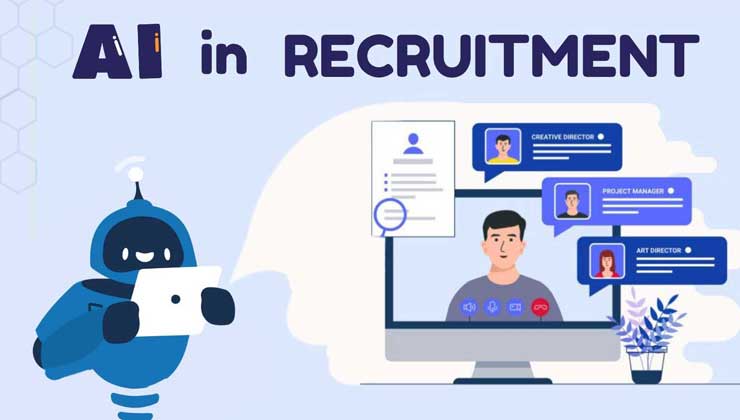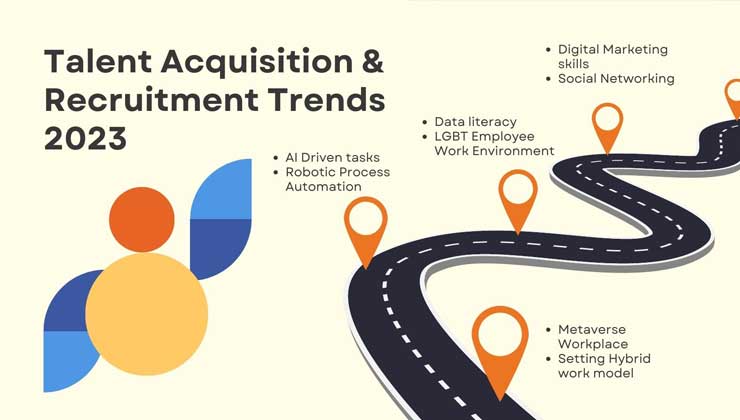You may take 100s of interviews and have selected a significant number of candidates to date.
Have you noticed? That you make many mistakes during that 20-25 mins of interview?
Indeed, whether knowingly or unknowingly, mistakes can occur.
Being an HR professional, you are responsible for filling positions within your organization and
optimizing the hiring process. You can optimize the hiring process by cost-saving techniques, minimize time-to-fill,
and ensure the highest quality of hire. The success of any company relies on making sound hiring decisions and
avoiding common mistakes during candidate interviews. As an HR professional, You play a key role in unlocking top
talent and building a thriving team.
Bonus Tip : A poor hiring process can result in
revenue loss, rising costs, missed opportunities, increased operational expenses, delayed
goal achievement, and broader impacts on the industry and economy. Learn How To speed up the Hiring
Process
See the stats that will give you an idea of mistakes made in an interview resulting in substantial consequences.
Do you know?
- 49% of employers reported making a bad hire because they overlooked crucial information during the interview.
(-CareerBuilder)
- 69% of companies say that a poor interview process significantly impacts the quality of hire. (- Brandon Hall
2015)
- 32% of organizations evaluate candidates during the interview process, while only 5% evaluate candidates during
the sourcing process. (- Brandon Hall 2015)
- 52% of interviewers decide about a candidate 5-15 minutes into the interview. (- Workopolis 2015)
The Harvard Business Review found that unstructured interviews, which lack a consistent set of questions and
evaluation criteria, have a validity of only 14%, making them highly unreliable for predicting a candidate's
future performance.
Now, let's understand the mistakes made by HR during interviews, whether intentional or unintentional and discuss
their potential solutions.
-
Not Providing Feedback After the Interview: You will be surprised if I tell you that about
91.55% of candidates do not receive any updates regarding the status of their job applications. And this is
the most significant pain for the
candidate; Out of numerous applications submitted, candidates barely receive any response from the
companies, and if they get a response that
too without telling them the reason for rejection.
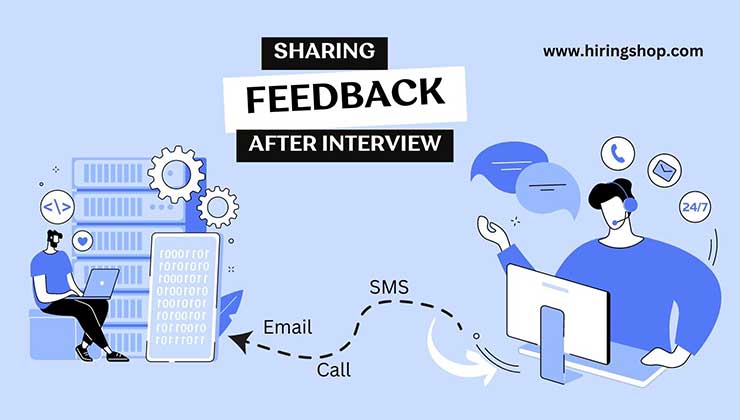
Emphasize that providing feedback is very important for a positive candidate experience. Taking feedback
demonstrates that you value the time, effort, and experience candidates invest throughout the interview
process.
Providing feedback contributes to a positive candidate experience and demonstrates that the employer values
the candidate's time and efforts in the interview process. What matters most is the feedback itself,
whether it is constructive or includes improvement areas. It overall contributes to a positive candidate
experience by offering guidance and insights.
Candidates deserve to know how they performed and the reasons (s) behind the hiring decision. And providing
feedback help candidate understand the decision-making process and contributes to the perception of a fair
and well-organized selection process.
Solutions
- Timeliness - Delayed feedback may not add value to the overall candidate experience and brand value.
Once an HR decide to accept or reject the resume, they should update the status to the candidate.
- Balanced feedback: Good feedback about their results (selected or rejected) and constructive criticism.
Acknowledge and highlight their strength and accomplishments with suggestions to help them enhance their
skills and qualifications.
- Professional and respectful tone - should use a tone that conveys support and encouragement while
offering constructive insights.
-
Lack of Preparation: The most common mistake among all HR is not preparing before starting
the interview. It has been often observed that whenever an HR is about to take the interview, they enter the
interview hall and ask generic questions. This can lead to disorganized and ineffective interviews, causing
HR to miss out on necessary information for informed decision-making.
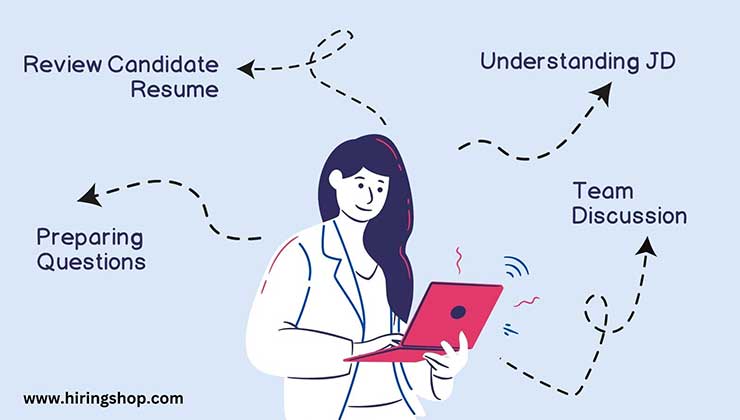
Solutions
- Thoroughly review the candidate’s resume before entering the interview cabin.
- Familiarize yourself with the job requirements.
- Prepare a set of relevant questions that will help you to know the candidate’s knowledge,
experience, problem-solving technique, etc.
-
Asking generic or irrelevant questions: The major drawback of asking generic or irrelevant
questions is the negative candidate experience. The candidate may think the interviewer is unprepared, so
ask generic or irrelevant questions. There are several other reasons to avoid asking generic or irrelevant
questions. Those reasons are
- It wastes time and resource
- The interviewer missed the opportunities to gather relevant information and ineffective assessment.
- do not help in screening top tallent
- Answers to the generic questions are already prepared
-
Do not focus on soft skills: Soft skills are crucial whether hiring for a higher role or
looking for a good team player. Soft skills like communication, teamwork, problem-solving, and leadership
abilities are critical to most roles. A candidate's abilities for effective collaboration in a team,
adaptation to new situations and communication with others can significantly impact the organization's
performance and
overall environment.
Solution:
Focusing on soft skills is necessary to maintain employees' and organizations' overall growth. To
solve this, you can incorporate questions and scenarios in your interview. Ask behavioural questions that
prompt candidates to demonstrate their behaviour in previous situations. Also, use role-playing or
hypothetical scenarios to observe how a candidate behaves and handles situations requiring soft skills.
Doing so lets you easily understand the candidate's overall suitability for the role.
-
Unconscious biases during an interview: You are interviewing someone known to you or
unknown; You should not be biased. Biases can lead to an unfair evaluation of candidates and the selection
of less qualified candidates or the exclusion of highly talented individuals. It also highly contributes to
a lack of diversity and inclusion. Unconscious biases can impact the company’s fostering innovation
and creativity, decrease employee morale, and damage the company’s reputation and growth. It can
potentially lead to legal consequences as it proves discrimination. And from an ethical standpoint, all the
candidates should be treated fairly.
Solution: You can take several measures to avoid unconscious biases during an interview.
- Implementing structured interviews is an excellent way to ensure consistency and minimize the influence
of biases.
- Train interviewers: this will spread awareness and enable the interviewer to recognize and address the
biases.
- Diversify interview panels: It will bring different perspectives to the table and help reduce the impact
of biases.
- Follow objective evaluation criteria to evaluate the candidate’s qualifications, skills, and
experiences.
- Regularly review and update interview practices.
You can create a more equitable and inclusive hiring process by actively addressing unconscious biases. It
will promote diversity and foster a positive company culture.
-
Not taking feedback: Taking feedback shows that you value the time and effort they invest and their experience throughout the interview
process. Candidates have a unique perspective and hence can give valuable feedback. Their feedback can shed light on
potential biases, inconsistencies or miscommunication that could affect the candidate's experience or fairness of the
selection process. Further, feedback can identify areas for improvement in the interview process, communication, or
candidate engagement strategies. By implementing constructive feedback, you can adjust the interview structure,
questions, or evaluation criteria, resulting in a more effective and efficient fair process over time.
Solutions
- Create a feedback mechanism
- Encourage honest feedback
- Act on feedback
-
Not Following a Standard Pattern of Interview: Following a standard pattern of the interview
will ensure consistency in evaluation and make fair and informed decisions. When all candidates for a
position use the same criteria and interview structure, it becomes easier to compare and helps make a
fair and informed decision about the best fit for the role.
Solution:
- Design an interview template
- Provide interview training
- Use structured interviews
- Document feedback and evauations
Bonus Tip : Uncover the major recruitment
challenges faced by agencies and explore effective solutions - Read more to gain valuable insights on
how to overcome recruitment
challenges faced by agencies!
-
Making quick judgment: We are humans and often make mistakes, which often means forming an
opinion based on limited information or initial impressions. We do not crosscheck the decisions or
evaluations derived. The same analogy applies here to making decisions without fully exploring
candidates' qualifications and potential. Rushing to the judgment may result in missing out on a highly
qualified candidate who may have been a good fit for the role.
Neglecting to provide feedback hinders a candidate's growth and significantly impacts their experience. A
candidate can sense when the interviewer makes quick decisions without adequately engaging in the interview
process. Ultimately, this will lead to a negative candidate experience, leading to a poor perception of
the organization and may spread negative word-of-mouth.
Solution
- Practice active listening
- Ask follow-up questions
- Utilize a structured evaluation process
- Take time for reflection and discussion.
-
Not seeking input from the team: Each team member brings their unique perspective and
expertise to the table, and not seeking their input is missing out on diverse viewpoints. Collaborative
decision-making results in a well-rounded evaluation and a comprehensive understanding. It could affect
the team dynamics, overall morale, and the result. Involving the team can foster a sense of teamwork and
shared responsibility in building a solid team.

Solutions
- Involve the team in the hiring process
- Establish clear communication channels
- Provide guidance and structure
- Facilitates collaborative decision-making
Finally, involving the team helps create a sense of shared ownership and commitment to the new team, leading
to stronger team cohesion and engagement.
-
Dominating the conversation: Dominating the conversation with the candidate will stop the
candidate from thoroughly engaging and sharing their thoughts, experience, and qualifications. It will not
give them sufficient opportunity to express themself and provide less information to access their
qualification & experience accurately.
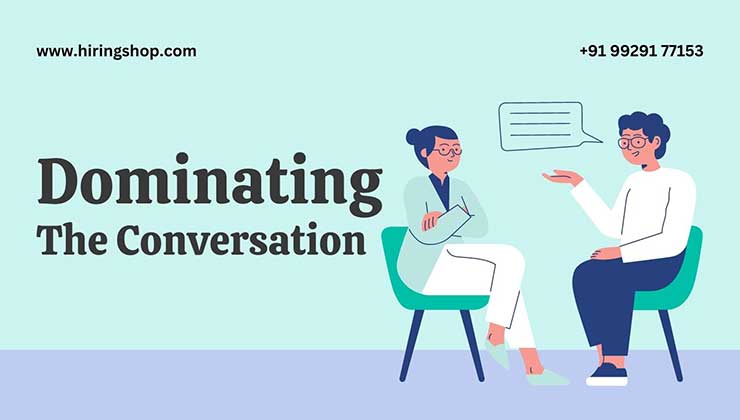
Dominating the conversation will not be able to accurately assess the candidate’s ability to articulate
their thoughts, actively listen and engage in a dialogue. Eventually, it can lead to an incomplete
evaluation of their communication skills and make candidates feel unheard or undervalued.
Solution:
- Active listening
- Ask open-ended questions
- Use follow-up questions
- Practice conversational balance.
-
Neglecting the discussion about the JD and role: It is very important that both the candidate
and the interviewer should be aware of the job’s requirements, responsibilities, and expectations. So
they both can be on the same page to discuss further. Once both have a basic understanding of the job, the
candidate can explain how he is the best fit, and the interviewer can evaluate whether he can be a good fit.

JD’s discussion further clarifies the candidate on specific roles and responsibilities associated with
the position. Discussing the JD allows candidates to ask questions, seek clarification, and express their
interest and enthusiasm for the position. During the interview, you can also evaluate how well the
candidate’s skills and background align with the role’s needs.
Solution:
- Introduce the JD at the beginning
- Encourage the candidate to ask questions
- Allow you to access the candidate’s knowledge and interest.
- Use examples or scenarios to help the candidate.
Trying to evaluate a candidate's behaviour, knowledge, and expertise within a brief interview timeframe may not provide
a comprehensive assessment. Nevertheless, as HR professionals, we are tasked with making critical hiring decisions based
on these interactions.
Making a definitive decision on selection or rejection can be challenging, as these outcomes are temporary. However,
what holds greater significance is our commitment to guiding candidates in their professional development. By doing
this, we are not only contributing to making the organization a better workplace but also cultivating our branding
by enhancing the candidate experience. So, Be the person to make a change.
By taking responsibility for our actions and actively seeking improvement, We contribute to making a wider
professional community and our organization a better workplace.
One machine can do the work of fifty ordinary men. No machine can do the work of an extraordinary man. - Elbert Hubbard
Together, let’s be the extraordinary man and foster an environment that promotes success,
inclusivity, personal development, and growth for all stakeholders.


